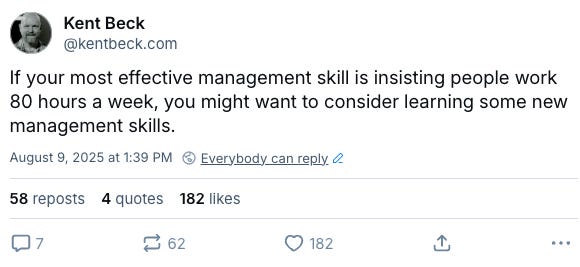Donuts
I once worked for a CEO who brought in a box of donuts every Saturday morning. If the donuts weren’t gone by Monday morning, we’d get a tongue lashing about how we didn’t care enough.
We set up a rota of employees who lived near the office to go in and throw away the donuts Sunday night.
Quick Quiz, No Tricks
How much water flows through a pipe of capacity 5?
5. Told you—no tricks. How much water flows through a sequence of pipes, both with capacity 5.
Same same. 5. (Yes, we can worry about turbulence & leakage at the boundary & all that. I’m making an analogy.)
What happens to the capacity of the system if we expand the capacity of the second pipe to 20?
What comes out of the second pipe? 5. Why? Because that’s all that went into it. Doesn’t matter how big the second pipe is. We can make it a million & all that will trickle out is 5.
To complete the picture, what if we expand the first pipe?
Capacity as measured at the end? 5. Again, doesn’t matter how much we expand the first pipe. We can’t put, as my Pappy would have said, 10 pounds of manure in a 5 pound bag. Well, Pappy wouldn’t have said “manure”, but we’re being professional here.
Application
As an executive you accept a trade. You live a life of service, no longer able to do the detailed work. For this loss of control you get wider influence, greater rewards.
One benefit of an executive position is that you can see the whole process, in ways those at the coalface cannot.
Product → Design → Engineering → Operations & Sales & Marketing is exactly one of these multi-pipe situations. Each department’s incentives align with improving their own capacity. You are uniquely positioned to look across the whole chain. (You are also responsible for improving across the whole chain.)
What can you do?
Find the narrowest pipe. Look up-stream & you’ll find half done work piling up. You can do this. They can’t. They are all working to keep their pipe going.
Make sure there’s enough buffer to keep the pipe busy, but no more. This may require reducing the output of upstream pipes. You can do this. They can’t. No one can voluntarily reduce their output.
Expand the narrowest pipe. Don’t bother with the pipes that aren’t narrowest. At best expanding them won’t help. At worst you’ll flood the system. You can do this. They can’t. They are overwhelmed with daily work.
Reduce demand on the narrowest pipe. Can you route some of its work elsewhere, even if that elsewhere isn’t ideal? Again, you can do this. They can’t. The folks getting their work re-routed won’t be happy. Boo hoo.
Stop improvement & shift attention when a new pipe is narrowest. You can do this. They can’t. Your people got credit for improvements (if you did it right). They want more credit.
Mea Culpa
I read the “80 hours weeks or else” pronouncement, got mad, & clapped back.
Here’s why I got emotional. That kind of pressure doesn’t work to get more accomplished. There is a natural limit to how much work comes out of a system. Pressure stresses the system, it doesn’t change the system, not in any positive way. So pressure is low benefit. How about cost?
I’ve seen mental health breakdowns (& had one myself). I’ve seen divorces, kids scarred. I’ve lived through 2 colleague suicides. The cost of pressure is high & permanent. Also, & this is what pisses me off, the consequences accrue to those least able to push back.
So I applied Thinkie Complain & Propose & wrote the above.
Conclusion
Drucker introduces so many effective management skills. Deming too. Matching the pipes is just the start.
You’ve chosen a grave responsibility, with life-changing consequences for your decisions. I wish for you the toolbox to go with that responsibility.
Interested in executive coaching? Augmented coding creates a slew of new Match the Pipes problems to go with the ones we were already struggling with. You can get help.






This is classic Theory of Constraints. I'm sure you've seen the "Nobody Ever Gets Credit for Fixing Problems that Never Happened" paper?
https://web.mit.edu/nelsonr/www/Repenning%3DSterman_CMR_su01_.pdf
If 80h a week is what they measure, that's what they're going to get.
Like the donuts "eaten" over the weekend in the opening story. The clocked hours will be there.
The value? Not so much.
Let's see how it works for them long term. Any bets?
As a reference:
https://cs.stanford.edu/people/eroberts/cs181/projects/crunchmode/econ-crunch-mode.html
"We have omitted from this list countless other studies that have shown [diminishing productivity] across the board in a great number of fields. Furthermore, although they may exist, we have not been able to find any studies showing that extended overtime (i.e., more than 50 hours of work per week for months on end) yielded higher total output in any field."